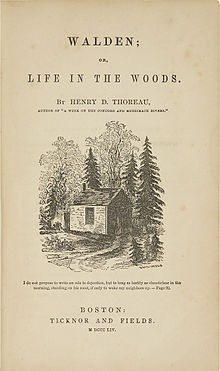
Back والدن Arabic Uolden, yaxud meşədə həyat Azerbaijani Уолдън Bulgarian Walden, o la vida als boscos Catalan Walden Czech Walden Welsh Walden German Walden Spanish Walden Estonian Walden Basque
 Original title page of Walden featuring a picture drawn by Thoreau's sister Sophia | |
| Author | Henry David Thoreau |
|---|---|
| Original title | Walden; or, Life in the Woods |
| Language | English |
| Genre | Memoir |
| Published | August 9, 1854[1] (Ticknor and Fields: Boston) |
| Publication place | United States |
| Media type | |
| Text | Walden at Wikisource |
Walden (/ˈwɔːldən/; first published as Walden; or, Life in the Woods) is an 1854 book by American transcendentalist writer Henry David Thoreau. The text is a reflection upon the author's simple living in natural surroundings. The work is part personal declaration of independence, social experiment, voyage of spiritual discovery, satire, and—to some degree—a manual for self-reliance.[2]
Walden details Thoreau's experiences over the course of two years, two months, and two days in a cabin he built near Walden Pond amidst woodland owned by his friend and mentor Ralph Waldo Emerson, near Concord, Massachusetts.
Thoreau makes precise scientific observations of nature as well as metaphorical and poetic uses of natural phenomena. He identifies many plants and animals by both their popular and scientific names, records in detail the color and clarity of different bodies of water, precisely dates and describes the freezing and thawing of the pond, and recounts his experiments to measure the depth and shape of the bottom of the supposedly "bottomless" Walden Pond.
- ^ Alfred, Randy (August 9, 2010). "Aug. 9, 1854: Thoreau Warns, 'The Railroad Rides on Us'". Wired News. Retrieved August 8, 2011.
- ^ transcendentalism and social reform by Philip F. Gura, Gilder Lehrman Institute of American History